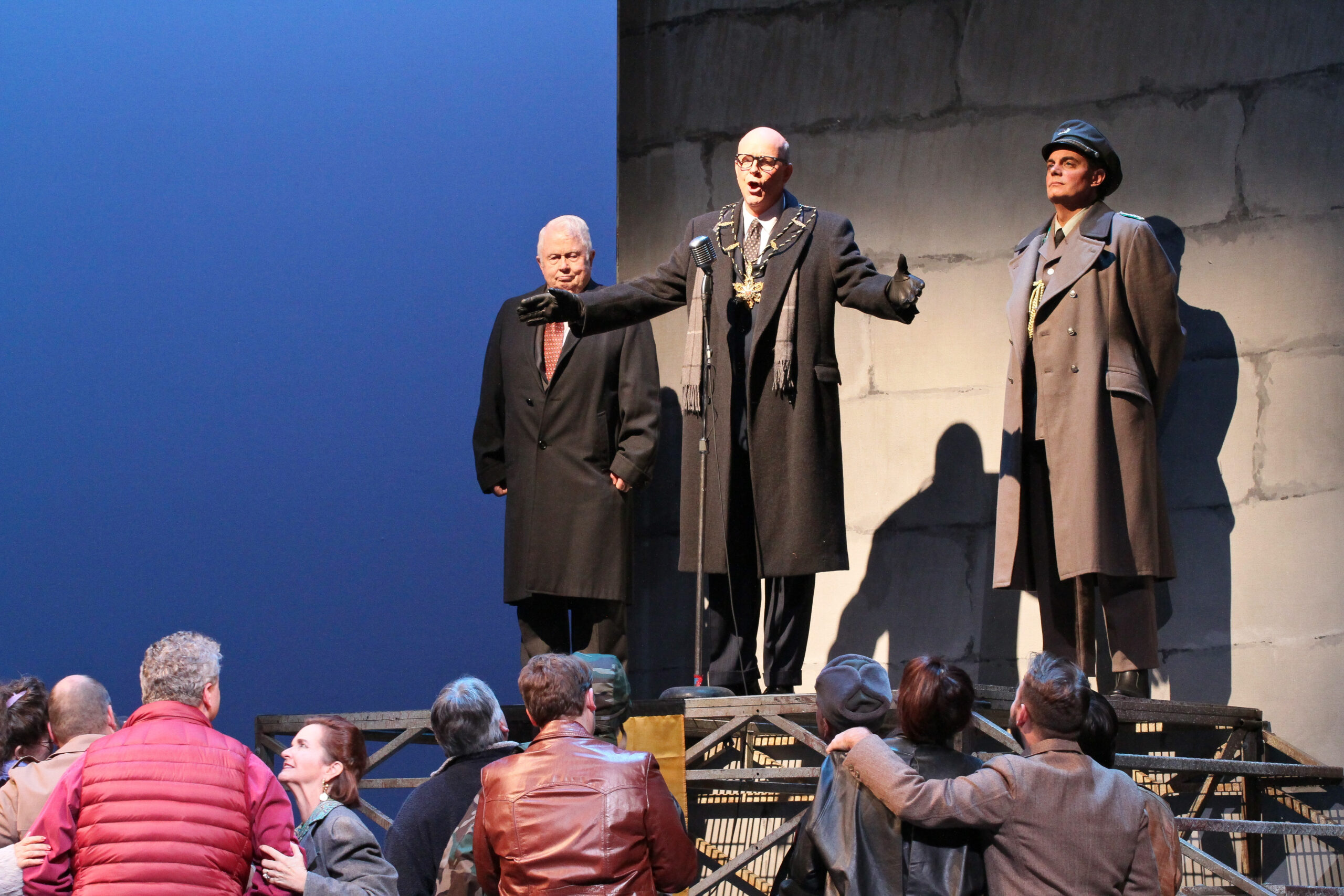It seems like a simple story: Leonore wants to save her husband from a political prison, so she pretends to be a young man named Fidelio, gets a job there, and springs him. Composer Ludwig van Beethoven worked with several librettists to create different versions of this opera, reducing its plot from three acts to two over the course of the years 1805-1814, with a focus on Leonore’s courage, her husband’s noble suffering, along with that of other prisoners, and their liberation.
But the current Opera Carolina production, directed by Tom Diamond and conducted by James Meena, adds another layer of meaning by moving the opera from late-18th century Spain to Germany in 1989, near the end of communist rule in East Berlin. This new context reverberates in ironic ways with our own—as capitalism today continues to spread certain freedoms and yet also involves political oppression in many countries (even those allied with the U.S.) by the wealthy wanting to stay in power.
Encouraging identification with the oppressed, this production shows, during the opera’s initial overture, Leonore being transformed by friends in Dresden, with a change of clothes and haircut, two months before the plot begins. This helps
feature a feminist twist already present in Beethoven’s work, which was popular in previous centuries, too, with women in “breeches roles” as an empowering disguise in many plays (or with boys playing women pretending to be men on Shakespeare’s stage). Today, even more than in 1989, it is conventional for women to have careers and wear power suits. But this version ofFidelio stresses Leonore’s vulnerability, sometimes in comic ways, even as an “angel” to her husband, through her transgendering.
Maria Katzarava’s powerful voice and plucky appearance in drag evoke sympathy for her as Leonore. This is so even in the comic situation of having her boss’s daughter, Marzelline (Raquel Suarez Groen), want to marry her—while she’s trying to save her husband. As her Stasi prison boss, Rocco, Andrew Funk becomes similarly sympathetic with his smooth bass tones and willingness to bend rules, through compassion for his prisoners and joy at his daughter’s betrothal.
Even Kyle Pfortmiller, as the villainous Walter Ulbricht (originally Don Pizarro), shows his desire for vengeance in tortured tones that convey how he also suffers through his violent passions. He gives “character assassination” as his reason for imprisoning, denying food to, and planning the murder of Leonore’s husband, Kurt Wismach (originally Florestan). But Pfortmiller shows that Ulbricht’s injured ego traps him as well, with increasingly cruel insecurities—representing not only the corruption of East German officials in the 1980s, but also the paranoia of many people in our Age of Terror today.
Tenor Andrew Richards, as Wismach, does not appear until the second act. Yet his aria, while chained to the bottom of basement stairs that tower over him, powerfully expresses the agony of many prisoners around the world, hoping for familial, legal, or divine contact and aid. Cloud shadows pass through the wall above him, beautifully showing the heights of freedom that most of us take for granted. Likewise, in the first act, over 30 prisoners are let out into the yard, expressing through choral song—yet also detailed, personal actions—a simple, profound joy that contrasts with the “tomb” of their captivity.
Some of the supertitles alter the German lyrics, substituting clichés as translations (from “everything changed” to “true love,” for example, or “hope-filled breast” to “heart”). The historical figures,Walter Ulbricht and Kurt Wismach, as replacements for character names, are also a bit out of place, since Ulbricht died in 1973 and Wismach escaped from East Berlin prior to the wall being built. (Opera Carolina’s website acknowledges this while explaining such choices). Yet the photos projected during overtures help greatly with this adaptation’s new context, even if Ronald Reagan’s voice, “Mr. Gorbachev, tear down this wall,” gives the former president too much of a godlike role.
The many levels of history and emotion in this production of Beethoven’s only opera make it an apt meditation for Charlotte audiences in its two remaining nights here (Oct. 22 and 25). It gives hope and joy, through its music and spectacle, like many of Beethoven’s compositions, especially his Ninth Symphony. But this opera may also stir us to do more for political prisoners, in whatever ways we can, or at least to become more aware of their struggles, as like and unlike ours, with the many walls in our current, conflicted world.
Read more from this article here


